 First introduced to international auds as the eldest daughter in Yorgos Lanthimos’ freakshow family portrait known as Dogtooth (2009), Aggeliki Papoulia returns to the fold holding the majority of the chips as Monte Rosa in ALPS. A nurse by day and a caretaker type character who moonlights during her off hours as part of band of well-intentioned misfits, Monte Rosa helps folk deal with the separation and grieving processes and distinctly is the most committed of the troupe playing teenage tennis player, English-speaking lover, best friend to the blind, a fake daughter and the perhaps a real daughter. In Greek and amusingly English dialogue, Papoulia offers an intense performance as someone who is either borderline crazy, mentally fatigued or simply, performing beyond the call of duty.
First introduced to international auds as the eldest daughter in Yorgos Lanthimos’ freakshow family portrait known as Dogtooth (2009), Aggeliki Papoulia returns to the fold holding the majority of the chips as Monte Rosa in ALPS. A nurse by day and a caretaker type character who moonlights during her off hours as part of band of well-intentioned misfits, Monte Rosa helps folk deal with the separation and grieving processes and distinctly is the most committed of the troupe playing teenage tennis player, English-speaking lover, best friend to the blind, a fake daughter and the perhaps a real daughter. In Greek and amusingly English dialogue, Papoulia offers an intense performance as someone who is either borderline crazy, mentally fatigued or simply, performing beyond the call of duty.This interview was conducted at the 2011 Toronto Int. Film Festival and Kino Lorber releases in limited theatres this month.
15 0 2 585
0
Dogtooth (2009)
Full Cast & Crew
Directed by
| Giorgos Lanthimos | ||
Writing Credits (in alphabetical order)
| Efthymis Filippou | ... | (writer) |
| Giorgos Lanthimos | ... | (writer) |
Cast (in credits order)
| Christos Stergioglou | ... | ||
| Michele Valley | ... |
Mother
| |
| Aggeliki Papoulia | ... |
Older Daughter
| |
| Hristos Passalis | ... |
Son
| |
| Mary Tsoni | ... |
Younger Daughter
| |
| Anna Kalaitzidou | ... |
Christina
| |
| Rest of cast listed alphabetically: | |||
| Steve Krikris | ... |
Colleague
| |
| Sissy Petropoulou | ... |
Secretary (as Athanasia Petropoulou)
| |
| Alexander Voulgaris | ... |
Dog trainer
| |
Produced by
| Giorgos Lanthimos | ... | co-producer |
| Iraklis Mavroidis | ... | executive producer |
| Athina Rachel Tsangari | ... | associate producer |
| Yorgos Tsourgiannis | ... | producer |
Cinematography by
| Thimios Bakatakis | ||
Film Editing by
| Yorgos Mavropsaridis | ||
Casting By
| Christina Akzoti | ||
| Alex Kelly | ||
Set Decoration by
| Elli Papageorgakopoulou | ||
Costume Design by
| Elli Papageorgakopoulou | ||
Makeup Department
| Vanessa Nerkanidou | ... | hair stylist |
| Sissy Petropoulou | ... | makeup artist (as Athanasia Petropoulou) |
Production Management
| Stavros Hrysogiannis | ... | production manager |
| Kolisoglou Olga | ... | assistant production manager |
Second Unit Director or Assistant Director
| Christos Nikou | ... | second assistant director |
| Kostas Papadakis | ... | first assistant director |
Art Department
| Magdalini Avgerinou | ... | set dresser |
| Dafni Iliopoulou | ... | set dresser |
| Dimitris Theoharis | ... | construction coordinator |
| Kyriaki Tsitsa | ... | set dresser |
Sound Department
| Leandros Ntounis | ... | sound recordist |
| George Ramantanis | ... | final mixer |
| Dimitris Rouhitsas | ... | boom operator |
| Yiannis Skandamis | ... | final mixer |
Special Effects by
| George Alahouzos | ... | special effects |
| Roulis Alahouzos | ... | special effects |
| Michalis Samiotis | ... | rain special effects |
Camera and Electrical Department
| Christos Douros | ... | first assistant camera |
| Thanasis Gogas | ... | electrician |
| Aggelos Mantzios | ... | second assistant camera |
| Giorgos Metaxas | ... | first assistant camera |
| Yiannis Papadakis | ... | grip equipment |
| Mihalis Rokos | ... | lighting technician |
| Thomas Varvias | ... | first assistant camera |
Costume and Wardrobe Department
| Magdalini Avgerinou | ... | assistant costume designer |
| Dafni Iliopoulou | ... | assistant costume designer |
| Kyriaki Tsitsa | ... | assistant costume designer |
Editorial Department
| Vangelis Gousias | ... | negative cutter |
| Nikos Katoufas | ... | colorist |
| Ioanna Pogiantzi | ... | assistant editor |
| Tony Ford | ... | colorist (uncredited) |
Other crew
| Giorgos Bikas | ... | production assistant |
| Nikos Borova | ... | production assistant |
| Maria Gizeli | ... | location manager |
| Angela Grimani | ... | receptionist |
| Theodoros Haralabidis | ... | runner |
| Vicky Miha | ... | assistant to producer |
| Christos Nikou | ... | script supervisor |
| Dimitris Nomikos | ... | titles typography |
| Maria Panaritou | ... | accountant |
| Gerasimos Pantos | ... | water truck operator |
| Sofia Papoulakou | ... | production secretary |
| Vasilis Parasamlis | ... | production assistant |
| Hristina Pigaki | ... | legal advisor |
| Hristos Pilatakis | ... | insurer |
| Kyriaki Symertziadou | ... | accountant |
| Dimitris Tolias | ... | accountant |
| Nikos Tsiolas | ... | production assistant |
| Sotiris Tsioutas | ... | accountant |
Thanks
Date of Birth
1975Mini Biography
She graduated from the theater school of "Empros" theater in 2000. She ia a founded member of the "blitz" theater group (2004) and within this group she writes, directs and acts in their plays.She also has taken part in numerous successful films such as "Dog tooth" (winning in Cannes Festival "Un Certain Regard",Montreal Festival du Nouveau Cinema "Citizen Kane" award and of course nominated for the Oscar of "Best Foreign Language Film of the Year" in 2011).IMDb Mini Biography By: georgia_athens
Box office / business for Dogtooth (2009) More at IMDbPro »Kynodontas (original title)
Opening Weekend
$6,686 (USA) (27 June 2010) (2 Screens)Gross
$110,197 (USA) (20 March 2011)$107,410 (USA) (13 March 2011)
$102,585 (USA) (13 February 2011)
$97,016 (USA) (6 February 2011)
$92,679 (USA) (30 January 2011)
$91,234 (USA) (23 January 2011)
$81,293 (USA) (9 January 2011)
$73,849 (USA) (2 January 2011)
$73,195 (USA) (12 December 2010)
$72,242 (USA) (5 December 2010)
$69,727 (USA) (28 November 2010)
$68,006 (USA) (21 November 2010)
$63,072 (USA) (14 November 2010)
$56,471 (USA) (26 September 2010)
$55,892 (USA) (12 September 2010)
$51,429 (USA) (5 September 2010)
$47,304 (USA) (29 August 2010)
$45,851 (USA) (22 August 2010)
$45,526 (USA) (15 August 2010)
$43,518 (USA) (1 August 2010)
$40,189 (USA) (25 July 2010)
$36,101 (USA) (18 July 2010)
$27,841 (USA) (11 July 2010)
$6,686 (USA) (27 June 2010)
Weekend Gross
$550 (USA) (20 March 2011) (2 Screens)$370 (USA) (13 March 2011) (2 Screens)
$917 (USA) (27 February 2011) (2 Screens)
$3,589 (USA) (13 February 2011) (5 Screens)
$3,734 (USA) (6 February 2011) (3 Screens)
$1,098 (USA) (30 January 2011) (2 Screens)
$393 (USA) (23 January 2011) (1 Screen)
$6,966 (USA) (9 January 2011) (2 Screens)
$442 (USA) (2 January 2011) (1 Screen)
$207 (USA) (12 December 2010) (1 Screen)
$1,883 (USA) (5 December 2010) (2 Screens)
$1,122 (USA) (28 November 2010) (1 Screen)
$1,679 (USA) (21 November 2010) (2 Screens)
$4,073 (USA) (14 November 2010) (2 Screens)
$231 (USA) (26 September 2010) (1 Screen)
$1,134 (USA) (12 September 2010) (2 Screens)
$3,633 (USA) (5 September 2010) (2 Screens)
$1,453 (USA) (29 August 2010) (1 Screen)
$158 (USA) (22 August 2010) (1 Screen)
$772 (USA) (15 August 2010) (2 Screens)
$1,829 (USA) (1 August 2010) (2 Screens)
$1,806 (USA) (25 July 2010) (1 Screen)
$2,528 (USA) (18 July 2010) (1 Screen)
$5,840 (USA) (11 July 2010) (2 Screens)
$6,686 (USA) (27 June 2010) (2 Screens)

Dogtooth (film)
| Dogtooth | |
|---|---|

Theatrical release poster
| |
| Directed by | Yorgos Lanthimos |
| Produced by | Iraklis Mavroidis Athina Rachel Tsangari Yorgos Tsourianis |
| Written by | Yorgos Lanthimos Efthymis Filippou |
| Starring | Christos Stergioglou Michelle Valley Aggeliki Papoulia Mary Tsoni Christos Passalis |
| Cinematography | Thimios Bakatatakis |
| Editing by | Yorgos Mavropsaridis |
| Studio | Boo Productions |
| Distributed by | Feelgood Entertainment |
| Release date(s) |
|
| Running time | 97 minutes[1] |
| Country | Greece |
| Language | Greek |
| Budget | €250,000[2] (US$323,000) |
| Box office | $384,147[3] |
The film won the Prix Un Certain Regard at the 2009 Cannes Film Festival and was nominated for Best Foreign Language Film at the 83rd Academy Awards.[5]
Plot
A married couple and their three young adult children, a son and two daughters, live in a large compound with a garden and swimming pool. A tall fence surrounds the property and the children have never been on the other side of it, for their parents have kept them unaware of the outside world, even of the existence of the telephone. They are taught different meanings for everyday words. For example, they are told that a "zombie" is "a small yellow flower," and that "sea" is a chair. The parents promise that each child will be ready to venture outside the compound once she or he has lost a dogtooth. Although the children are told they have a brother just on the other side of the barrier, he never appears.The only non-family member to come into the house is Christina, a young woman who works as a security guard at the father's factory. She is driven by the father to the compound – travelling both ways blindfolded – where she performs sexual favors for the son. Dissatisfied with his preference for intercourse, Christina seeks oral sex from the elder daughter in exchange for a headband. The elder daughter obliges but does not recognize the significance of performing cunnilingus. Later, she gives the headband to her younger sister, in exchange for being licked on the shoulder, which is marked by an unexplained scar.
The parents have tricked the children into believing that overhead planes are merely toys. They allow the children to search for toy planes that they have planted on the grounds, and the child that finds the toy owns it. One day the older daughter finds her brother playing with her plane; she retaliates by cutting his arm with a kitchen knife.
The father visits a dog training facility and demands to have his dog returned. The trainer refuses because the dog has only reached the second stage of a five-stage training. He lectures the father on the merits of retaining a dog in training until its training is complete, and warns against the untimely cessation of training. He poses the question: "Do we want an animal or a friend?" The father is impatient to receive the dog, as he expresses to his wife. When the arrival of the dog is considered imminent, the parents tell the children that the mother will soon give birth to "two children and a dog", but promise that the birth of the children can be forgone if the son and daughters show improvement in their behavior.
The siblings are terrified by the appearance of a stray cat in the garden. Considering it a threat, the son ambushes and kills it with a pair of pruning shears. The parents decide to take advantage of the incident. The father shreds his clothes, covers himself in fake blood, and comes home, where he tells his children that their unseen brother was mauled to death by a cat, the most fearsome creature. The children are taught to get down on all fours and bark maniacally as a precaution against cats. A memorial service is held for the brother, in which the family members lob flowers over the fence, in mourning.
Christina is again brought to the compound to perform her services and she once more requests oral sex from the elder daughter. However, the daughter rejects Christina's offer of hair gel as a reward, choosing instead the two films in Christina's bag (Rocky IV and Jaws). Christina refuses to hand over the films, but eventually agrees under threat of blackmail. The elder daughter watches the films at night, and they have a significant influence on her. She recreates scenes from the films and quotes them in her free moments. The father finds the videotapes, fashions one into a weapon with packing tape, and uses it to beat his daughter's head. Then he goes to Christina's flat, removes her VCR player from the wall and knocks her off her chair with it. As he leaves, he curses her future children to be corrupted by "bad influences."
In the middle of the night, the son's knee is injured with a hammer and he accuses his younger sister. She claims he was attacked by a cat with a hammer and the father accepts her story. The parents quickly decide that, with Christina no longer available, they should allow the son to choose one of the daughters as a replacement. After fondling both sisters simultaneously in the bath with his eyes closed, he chooses the elder, who is later dressed and prepared by the mother for the sexual encounter. The elder daughter is visibly uncomfortable during intercourse, and afterwards recites a threatening passage from Rocky IV to her brother.
The elder daughter's agitation begins to show during the children's dance performance staged for the parents' wedding anniversary. She dances the choreography from Flashdance to exhaustion and then devours her dessert. Later, in the bathroom, she smashes her face with a dumbbell to knock out a dogtooth. Smiling and bloody, she runs undetected through the garden and to the car, where she lets herself into the trunk and closes it over her. The father discovers her blood and tooth fragments in the sink that night. He runs outside the compound and searches in the tall grass while the other three remain just inside the grounds, barking like dogs on all fours. In the morning, the son and younger daughter hold each other and kiss, while the father drives to work, unwittingly carrying the elder daughter in her hiding place. The father goes inside. The car sits outside, unattended, but the daughter remains in the trunk.
Cast
- Christos Stergioglou as father
- Michelle Valley as mother
- Aggeliki Papoulia as older daughter
- Mary Tsoni as younger daughter
- Christos Passalis as son
- Anna Kalaitzidou as Christina
Production
Dogtooth was the feature film début for Boo Productions, an Athens-based advertising company. The Greek Film Center supported the project with about €200,000 and much of the production was done with help from volunteers.[6] Another €50,000 was offered by the production studio, bringing the overall budget to €250,000.[2] Anna Kalaitzidou and Christos Passalis were stage actors who were cast after having worked with Lanthimos earlier. Mary Tsoni was not a professional actress, but a singer in a punk band.[7] Lanthimos had an open approach to both acting and visual style, as he thought it would look fake if he involved too much in the details. It wasn't until the rehearsals started that he began to develop the idea of how the film should be shot, a style where he tried to combine a realistic environment with "really strict framing and a cool, surreal look to go with the narrative".[8]Release
The film premiered on 18 May at the 2009 Cannes Film Festival,[9] and went on to screen within such festivals as Toronto International Film Festival and Maryland Film Festival. It was released in Greece on 11 November the same year through Feelgood Entertainment.[10][11] Verve Pictures picked up the British distribution rights and launched it on 23 April 2010.[8] The American premiere was on 25 June 2010, managed by Kino International.[12]Reception
In its home country, Greek critic Dimitris Danikas gave the film a rating of eight out of ten ("with enthusiasm") and characterizes it as "black, surreal, nightmarish." He believes that Dogtooth is as important for Greek cinema as Theodoros Angelopoulos' 1970 film Reconstruction.[13] He goes on to say "Lanthimos composes and goes from one level to another like a wildcat-creator, constantly and continuously maintaining the same rigorous style. Hence the aphasia; hence the uniformity; hence the submission and the scheduled mass culture; hence also the serial killer; hence, however, the disobedience, the anarchy. As I said at the beginning: Dogtooth has the surrealism of Buñuel, the scalpel of Haneke, the underground horror of a thriller without the splatter. Perfect."[13] Danikas characterized Dogtooth's Academy Award nomination as "the greatest Greek triumph of recent years."[14] Columnist Dimitris Bouras, writing for Kathimerini, refers to "the beneficial effects that the prestigious award could have" and believes that the nomination reveals three interesting facts: "1) in Greece we need to be extroverts (and not only in cinema), 2) exportable product is whatever has an identity, 3) Dogtooth's nomination is like an investment – manna from the heaven of Hollywood for the developing Greek cinema."[15]- International
Peter Bradshaw of The Guardian praised the filmmakers' technique, finding it "superbly shot, with some deadpan, elegant compositions, and intentionally skewiff framings".[18] Roger Ebert (Chicago Sun-Times) gave the film three out of four stars. He noted the director's "complete command of visuals and performances. His cinematography is like a series of family photographs of a family with something wrong with it. His dialogue sounds composed entirely of sentences memorized from tourist phrase books."[19] Mark Olsen of the Los Angeles Times said "All of the film's purposeful weirdness is conveyed with an unaffected simplicity that recalls the dead-aim haphazard compositions of photographer William Eggleston." He concluded that "as a film, it's pure and singular, but it's not quite fully formed enough to be what one could call truly visionary."[20][20] A. O. Scott of The New York Times wrote that the film "at times seems as much an exercise in perversity as an examination of it" and "The static wide-screen compositions are beautiful and strange, with the heads and limbs of the characters frequently cropped. The light is gauzy and diffuse, helping to produce an atmosphere that is insistently and not always unpleasantly dreamlike. You might think of paintings by Balthus or maybe Alex Katz, though the implied stories in those pictures are more genuinely evocative and haunting than the actual narrative of Dogtooth."[21]
Several reviewers, such as Harkness and Bradshaw, made comparisons to the 2008 Fritzl case, although they pointed out that the screenplay had been written before the case emerged.[17][18] Scott, like Ebert, made references to homeschooling.[19][21]
The film's larger meanings eluded easy expression. Scott called the film "a conversation piece. Though the conversation may... be more along the lines of: 'What was that?' 'I don’t know. Weird.' 'Yeah.' [shudder]. 'Weird.'"[21] Olsen saw Dogtooth's substance as "part enigma, part allegory and even part sci-fi in its creation of a completely alternate reality."[20] While Ebert found a "message...: God help children whose parents insanely demand unquestioning obedience to their deranged standards.... [S]ome have even described the film as a comedy. I wasn't laughing."[19] For Bradshaw, the film investigates "the essential strangeness of something society insists is the benchmark of normality: the family, a walled city state with its own autocratic rule and untellable secrets."[18] Harkness notes the "absolute mockery the situation makes of the perfect family ideal" where "Lanthimos isn't interested in making specific political or social points and he refuses to offer any clarifying backstory"; he found Dogtooth's oddness "as organic and playful as its impact is incisor sharp." [17]
Controversies
The film has at a large extent copied the 1972 Mexican film The castle of purity (El Castillo de la Pureza). However, Greek press and film critics have managed to keep the debate away from the identity of the two films.Accolades
Greek Prime Minister George Papandreou ended the Cabinet meeting on 25 January 2011 by saying "The news that the film Dogtooth by Yorgos Lanthimos is nominated for Best Foreign Language Film goes far beyond the world of cinema, arts and culture. It concerns the whole country, its people, the new generation of artists who follow the motto "Yes, we can do it" during difficult times."[22] He continued by saying "I won't say that the news shows that miracles happen, because the success of Yorgos Lanthimos is based on hard work, talent and his endless potential. Features that characterize the creative forces which lead Greece to a new era; forces which deserve our support and they will have it. Bravo Yorgos."[22]The film was chosen unanimously by the Greek Film Committee to represent Greece at the Oscars.[23]
| Event | Category | Winner/Nominee | Won |
|---|---|---|---|
| Academy Awards[24][25] | Best Foreign Language Film | Yorgos Lanthimos | No[26] |
| British Independent Film Awards[27][28] | Best Foreign Film | Yorgos Lanthimos | No |
| Cannes Film Festival[29][30] | Prix Un Certain Regard | Yorgos Lanthimos | Yes |
| Prix de la Jeunesse | Yorgos Lanthimos | Yes | |
| Dublin International Film Festival[31] | Dublin Film Critics Award | Yorgos Lanthimos | Yes |
| Estoril Film Festival[32] | Grande Premio | Yorgos Lanthimos | Yes |
| Hellenic Film Academy Awards[33][34] | Best Feature Film | Yorgos Lanthimos | Yes |
| Best Director | Yorgos Lanthimos | Yes | |
| Best Screenplay | Yorgos Lanthimos and Efthimis Filippou | Yes | |
| Best Actress | Aggeliki Papoulia | No | |
| Best Actor | Christos Sterioglou | No | |
| Best Supporting Actor | Christos Passalis | Yes | |
| Best Post-Production | Yorgos Mavropsaridis | Yes | |
| Award for Special Effects and Film Innovation | George and Roulis Alahouzos | No | |
| Ljubljana International Film Festival[35][36] | Kingfisher Award | Yorgos Lanthimos | Yes |
| Mar del Plata Film Festival | Best Film | Yorgos Lanthimos | No |
| Montréal Festival of New Cinema[37] | Feature Film Award | Yorgos Lanthimos | Yes |
| RiverRun International Film Festival[38] | Best Director | Yorgos Lanthimos | Yes |
| Sarajevo Film Festival[39][40] | Special Prize of the Jury | Yorgos Lanthimos | Yes |
| Heart of Sarajevo (Best Actress) | Aggeliki Papoulia and Mary Tsoni | Yes | |
| Sitges Film Festival[41] | Best Motion Picture Fantastic Award | Yorgos Lanthimos | Yes |
| Citizen Kane Award for Best Directorial Revelation | Yorgos Lanthimos | Yes | |
| Best Film | Yorgos Lanthimos | No | |
| Stockholm International Film Festival[42] | Bronze Horse | Yorgos Lanthimos | Yes |
See also
- List of Greek submissions for the Academy Award for Best Foreign Language Film
- List of submissions to the 83rd Academy Awards for Best Foreign Language Film
- Homeschooling
References
- Jump up ^ "DOGTOOTH (18)". British Board of Film Classification. 2010-01-08. Retrieved 2012-12-05.
- ^ Jump up to: a b Rapold, Nicolas (2010-06-24). "From Greece, a Parable About ... Something". nytimes.com (NYTimes). Retrieved 2010-06-24.
- Jump up ^ Dogtooth at Box Office Mojo
- Jump up ^ "Kynodontas (Dogtooth)". Cannes Film Festival. festival-cannes.com. Retrieved 2009-05-23.
- Jump up ^ "83rd Academy Awards Nominations Announced". oscars.org. 2011-01-25. Retrieved 25 January 2011.
- Jump up ^ Katsareas, Eftehia (2009-12-03). "The surprising Greek film winning fans abroad". cnn.com (CNN). Retrieved 2010-05-08.
- Jump up ^ Eyles, Priscilla (2010-04-26). "Interview: Giorgos Lanthimos, director of Dogtooth". Sound Screen. Retrieved 2010-05-08.
- ^ Jump up to: a b Jahn, Pamela (2010-04-05). "Dogtooth: Interview with Yorgos Lanthimos". Electric Sheep Magazine. Retrieved 2010-05-08.
- Jump up ^ "Dogtooth – Press Kit". Cannes Film Festival. festival-cannes.com. Retrieved 2009-05-23.
- Jump up ^ "Film profile: Dogtooth". Cineuropa. Retrieved 2011-01-26.
- Jump up ^ Proimakis, Joseph (2010-09-02). "Interview with Irini Souganidou • Distributor, Feelgood Entertainment". Cineuropa. Retrieved 2011-01-26.
- Jump up ^ "Dogtooth". indieWire. Retrieved 2011-01-26.
- ^ Jump up to: a b Danikas, Dimitris (2009-10-22). "Greek leadership". TA NEA Online. Retrieved 2011-01-31.
- Jump up ^ Danikas, Dimitris (2011-01-26). "Dogtooth Nominated for an Oscar". TA NEA Online. Retrieved 2011-01-31.
- Jump up ^ Bouras, Dimitris (2011-01-31). "Investing Extroversion". Kathimerini. Retrieved 2011-01-31.
- Jump up ^ "Rotten Tomatoes: Dogtooth (Kynodontas)". rottentomatoes.com. Flixter. Retrieved 2011-02-21.
- ^ Jump up to: a b c Harkness, Alistair (2010-04-24). "Film Review: Dogtooth". The Scotsman (Edinburgh). Retrieved 2011-01-26.
- ^ Jump up to: a b c Bradshaw, Peter (2010-04-22). "Dogtooth". The Guardian (London). Retrieved 2011-01-26.
- ^ Jump up to: a b c Ebert, Roger (2010-07-07). "Dogtooth". Chicago Sun-Times. Retrieved 2011-01-26.
- ^ Jump up to: a b c Olsen, Mark (2011-01-07). "Movie review: 'Dogtooth'". Los Angeles Times. Retrieved 2011-01-26.
- ^ Jump up to: a b c Scott, A. O. (2010-06-25). "A Sanctuary and a Prison". The New York Times. Retrieved 2011-01-26.
- ^ Jump up to: a b Zoumboulakis, Yannis (2011-01-26). "Dogtooth biting his uncle Oscar". TO BHMA Online. Retrieved 2011-01-31.
- Jump up ^ "Η ταινία "Κυνόδοντας" πηγαίνει στα Oσκαρ". enet.gr. Retrieved 2011-01-27.
- Jump up ^ "Greece Submits "Dogtooth" for Foreign Language Film Entry @ Academy Awards". Greek Reporter Hollywood. Retrieved 2010-09-28.
- Jump up ^ "Beautiful but doomed: Greece submits ‘Dogtooth’ for Oscars". incontention.com. Retrieved 2010-09-28.
- Jump up ^ "Nominees for the 83rd Academy Awards". oscars.org. Retrieved 2011-01-25.
- Jump up ^ "The Moet British Independent Film Awards Announce Nominations and Jury for 13th Edition". bifa.org. Retrieved 2010-11-21.
- Jump up ^ "British Independent Film Awards: 2010 Winners". bifa.org. Retrieved 2010-12-06.
- Jump up ^ "Un Certain Regard Awards Ceremony". Cannes Film Festival. festival-cannes.com. Retrieved 2009-05-23.
- Jump up ^ "PALMARES DU PRIX DE LA JEUNESSE AU FESTIVAL DE CANNES". jeunesse-vie-associative.gouv.fr. Retrieved 2 February 2011.
- Jump up ^ "Fading light on film festival". irishtimes. 2010-03-03. Retrieved 2010-05-07.
- Jump up ^ "Main Prize Estoril Film Festival". Estoril Film Festival. estoril-filmfestival.com. Retrieved 2010-05-07.
- Jump up ^ "Greek Oscars were given away!". grreporter. Retrieved 2010-05-07.
- Jump up ^ "Night of Greek Oscars is coming!". grreporter. Retrieved 2010-05-07.
- Jump up ^ "'Dogtooth' wins first prize at Ljulbljana film festival". Athens News. Retrieved 2011-02-02.
- Jump up ^ "PRESS RELEASE NO. 11 21st Ljubljana International Film Festival – LIFFe". Ljubljana International Film Festival. liffe.si. Retrieved 2011-02-02.
- Jump up ^ "Dogtooth hooks Split". cineuropa.org. Retrieved 2011-01-27.
- Jump up ^ "2010 RiverRun Award Winners". riverrunfilm. Retrieved 2010-05-07.
- Jump up ^ "Dogtooth, Ordinary People, Eastern Plays and Storm Awarded in Trieste". sff.ba. Retrieved 2010-05-07.
- Jump up ^ "Dogtooth Receives an Award at the 31st Cinemed". sff.ba. Retrieved 2010-05-07.
- Jump up ^ "Dogtooth: Sitges Film Festival". Sitges Film Festival. sitgesfilmfestival.com. Retrieved 2010-05-07.
- Jump up ^ "Dogtooth – Stockholms filmfestival". Stockholm International Film Festival. stockholmfilmfestival.se. Retrieved 2010-05-07.
External links
Dogtooth: Interview with Yorgos Lanthimos
Format: Cinema
Release date: 23 April 2010
Venue: Gate, Odeon Covent Garden, Renoir, Ritzy (London) + key cities
Distributor: Verve Pictures
Director: Yorgos Lanthimos
Writer: Efthymis Filippou, Yorgos Lanthimos
Original title: Kynodontas
Cast: Christos Stergioglou, Michelle Valley, Aggeliki Papoulia, Mary Tsoni, Hristos Passalis, Anna Kalaitzidou
Greece 2009
94 mins
Release date: 23 April 2010
Venue: Gate, Odeon Covent Garden, Renoir, Ritzy (London) + key cities
Distributor: Verve Pictures
Director: Yorgos Lanthimos
Writer: Efthymis Filippou, Yorgos Lanthimos
Original title: Kynodontas
Cast: Christos Stergioglou, Michelle Valley, Aggeliki Papoulia, Mary Tsoni, Hristos Passalis, Anna Kalaitzidou
Greece 2009
94 mins
Pamela Jahn: In Dogtooth you’re telling a story about a dysfunctional family that abandons the norms, rules and logic that have been taken for granted in society. What attracted you to this kind of subject matter?
Yorgos Lanthimos: It didn’t really start as a story about family dysfunction as such. In the beginning, I was wondering about family life and parenting in general and if the way we think about it would ever really change. But I had a conversation with some friends one day, and I was making fun about the fact that two of them were getting married and having children, because today many people get divorced and kids are being raised by single parents, so I said there was no point in getting married. But although I was obviously just joking, all of a sudden they got extremely defensive about what I had said. This made me realise how someone I knew and who I would never have expected to react that way freaks out when you mess about with his family. And that’s how I got the initial idea about this man who would go to extremes to protect his family, and who would try to keep his family together forever by keeping his children away from any influence from the outside world, being firmly convinced that this is the best way to raise them.
But it’s obviously a bit more than just keeping them away from the outside world, because the parents also play pretty cruel games with their children and teach them nonsense.
The thing is that because the father really does have the best intentions for his children, or at least that is what he believes, he tries to provide them with the best environment to grow up in, like this big house with a big garden and a swimming pool and all that. But at the same time, he has to create all these myths and fears so that the children don’t dare going out of the house. But since he has been able to do that from the moment they were born it also shows just how much you can influence people’s minds and create a view of the world for them that is exactly the way you want it.
Read our review of Dogtooth.
It’s also interesting that you decided not to give any background information about why the parents decided to raise their children this way in the first place. Yes, that was very important to me from the beginning, because I think it would have been a completely different film otherwise – you would be too engaged in judging if it was right for them to behave that way depending on the reasons they had for doing so. What interested me most was the result of their actions and to see how far you can go when messing with people’s minds and making them believe the things that you want them to believe. It’s a very dangerous thing to do and I hope my film provokes reactions from people because in the film it is obviously too late. Sooner or later this had to explode.
It all seems to work out until Christina comes into play, a woman who is brought into the house by the father on occasion to have sex with his son. She is basically the trigger that starts the fatal chain of increasingly violent events.
That’s right, she is the trigger. But what fascinates me most about her character is that she enters this obscure world and for her there is a temptation to take advantage of the situation and of the children. For example, she demands things from the older sister so they start dealing in this way, ‘I give you that, so why don’t you give me this’. You can feel the power Christina has, which she plays out on the children. It’s the temptation to take advantage of the weaker ones, and that’s what I like about her character. I think I would be tempted to act in the same way if I came into contact with someone so naïve, and to fool them and get whatever I want from them. Why not do it?
Although the son is daddy’s darling and gets special treatment, the two girls seem much more mature and stronger. How did you develop the different characters of the siblings?
I do believe that girls or women in general are stronger characters than boys. They are the smartest ones (laughs). So it was just natural for me that the older boy would be the father’s favourite, but at the same time he tries the hardest and seems somewhat more immature. But it also has to do with the fact that boys are seen as much more deserving of having sex and entitled to more things than the girls. When it comes to the girls, the parents never think that they need to be educated about sex and they deal with them in a much more conservative way. So it creates this bizarre situation, where they just discard any kind of thought about this with regard to the girls. For the boy, however, they are very proud of him having sex. At least this is the mentality we have in Greece. I have to admit, it’s quite dated, but I guess it still exists in other countries too.
How much research did you do before or while writing the script?
We didn’t do any research at all, because I thought it was such a surreal story we were working on. It was only afterwards, when we were already rehearsing, that this Austrian story came out about the father who kept his daughter in the basement, where she grew up like an animal, and he had children with her. But still, this felt very different from what we were trying to do since it had a very different tone to it, way too dark and dreadful.
Your film has a ferocious wit and a great sense of humour, which at times makes it feel more like an inverted comedy, in which absurdity gets out of control when some sort of normality finds its way in. Why was humour so important to you in this story?
That’s true (laughs)… It’s interesting what you’re saying. I actually never thought about it in this way, but it was the only way for me to approach the subject, because to really go deep into things the film had to be violent and, at the same time, have a great sense of humour, with the contradiction of being in an open space with light and beautiful garden and beautiful children. I think it brings out the most intense and powerful emotions when you experience contradictions like this. By employing a certain sense of humour you essentially get more serious about things and show conflict more effectively than if you were overly dramatic or only violent because that’s a one-way approach that just forces audiences to watch something appalling. With humour you can really make people think in many different directions, and it feels like a more existential experience to me. I always try to infuse humour into my work. I also work in theatre a lot, and you often end up working on a play without much humour. But it is very important for me to always find a way to introduce the ridiculous side of things into whatever I do, no matter how dramatic or tragic the given situation is.
It seems quite clear that you are not advocating violence because we see that the kids’ actions lead to some very nasty events. On the other hand, violence and dancing seem to be the only ways for the siblings to express their frustration at their lack of freedom.
I am very close to physicality in general, and I think I can only really work things out that way. I only work physically with the actors when rehearsing. I don’t sit down with them to analyse their parts in terms of what they should be thinking of and how they should approach their character. I just don’t like analysing things too much and I guess that’s why I deal with things physically. It just feels more real to me, and especially in film, where you have actors pretending to be a character in a situation. I don’t like setting up a frame of mind in their head. I just like them to act, literally speaking.
Did you have a clear idea from the beginning of how you were going to approach the visual style of the film?
I never try to visualise a film while writing the script or when I am casting. This happens only when I start rehearsing, I start getting an idea of what the film could look like. And in this particular film I thought it should be shot in a way that was quite realistic on the one hand – for example, there is not much lighting and the location is real – but with really strict framing and a cool, surreal look to go with the narrative. I guess that this is also related to my general philosophy about filmmaking. To me, it looks fake if you try to be too involved in the way you film things and if you ask your actors to get really emotionally involved. As much as I don’t like forcing feelings onto my actors, I also don’t like forcing them onto the audience. I prefer to keep the film open to allow people to get engaged in their own way. So I try to not guide people to conclusions too much, but rather expose things and have the audience react to what is happening on screen. For me, it is also a way of avoiding being too didactic in my films.
Dogtooth feels like a slap in the face of suburban life. In that sense, is it a personal story too?
No, it’s exactly the opposite. I grew up with only my mother, she got divorced when I was very young, and she died when I was 17 years old. From then on, I was by myself, so I had to go out into the world quite early and earn a living and study and do all these things. So, in a way I am observing the characters and the story in the film from a very different point of view. But even so, I really don’t know what I would do if I was a parent. If you asked me today how I would raise my children I would say that I’d try to have them experience freedom and be much more in contact with the world, and I think I would live somewhere in the centre of the city where they can come into contact with as many different elements of life as possible. But I am saying this now and in a year or so we might be speaking again and I might live in a nice suburban house with a garden and a swimming pool… who knows? I really don’t know what life has in store for me, but it’s amazing how your mind can fool you sometimes. (laughs)
Beautiful but doomed: Greece submits ‘Dogtooth’ for Oscars
Posted by Guy Lodge · 4:44 am · September 17th, 2010
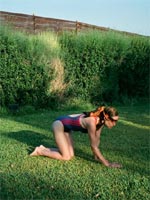 Last year, I was erroneously notified that Greece had submitted Yorgos Lanthimos’s boundary-pushing festival hit “Dogtooth” as their entry for the 2009 foreign-language Oscar. As it turned out, they hadn’t — and the film wouldn’t have qualified under the Academy’s release date requirements anyway.
Last year, I was erroneously notified that Greece had submitted Yorgos Lanthimos’s boundary-pushing festival hit “Dogtooth” as their entry for the 2009 foreign-language Oscar. As it turned out, they hadn’t — and the film wouldn’t have qualified under the Academy’s release date requirements anyway.Well, one year later, and here we are again. Except this time, “Dogtooth” has officially been submitted by the Greek selectors, after taking top honors at the country’s own national film awards.
All of which immediately positions it as one of the best films in the running for the Academy Award, as well as one of the longest shots to be nominated — unless the bluehair voters who thought “The Secret in Their Eyes” superior to “A Prophet” have suddenly acquired a taste for pitch-black adult fairy tales of sexual repression, incest and feline mutilation. But here’s hoping.
In its favor, “Dogtooth” — which has traveled some way in the 16 months since it took the Un Certain Regard prize at Cannes — arrives in the race with a higher profile than it had a year ago, having already been released Stateside to a raft of admiring reviews. (I reviewed it out of the London Film Festival last year, and wound up placing it on my Best of 2009 list — rather too low, in hindsight.)
It’s precisely the kind of challenging, significant work that the foreign-language branch’s executive committee was designed to assist in the race. (In case you’ve forgotten the system, this smaller, more discerning committee selects three titles to add to the six voted in by the foreign-language branch to make up the pre-nomination shortlist.) I fear “Dogtooth” will prove too avant-garde even for their sensibilities, but if any critical groups come through for it at the year’s end, there’s a slim chance the committee may feel suitably compelled. Either way, bravo to Greece for choosing so fearlessly.
Meanwhile, other countries that have entered the race since my last update include Finland (“Steam of Life”), Azerbaijan (“The Precinct”) and Croatia (“The Blacks”). If you know anything about these, enlighten us in the comments section.
[Photo: Kino International]
Movie Review | 'Dogtooth'
Dogtooth (2009)

Kino International
Mary Tsoni in “Dogtooth.”
A Sanctuary and a Prison
By A. O. SCOTT
Published: June 24, 2010
Plenty of parents try to instill their values in their children and shield the little ones from the perils and temptations of the outside world. The mother and father in “Dogtooth,” a Greek festival-circuit conversation piece directed by Yorgos Lanthimos, present an extreme case of this kind of protectiveness. Their idea of home schooling is to provide their children with daily tape-recorded vocabulary lessons, which would not be unusual if the definitions were less idiosyncratic. The three kids — two daughters (Aggeliki Papoulia as the elder, Mary Tsoni as the younger) and a son (Hristos Passalis) — are taught that “excursion” refers to a kind of flooring material and that a “sea” is a kind of armchair.
Odd. Odder still is that the children, who have never been given names or left the grounds of the quiet, green family estate, appear to be in their late teens or early 20s. Their father (Christos Stergioglou) is a factory manager, and he and his wife (Michelle Valley) have turned their home, its swimming pool and lush lawns surrounded by high wooden fences, into a sanctuary and prison for their dreamy offspring. Those three wander about in their underwear, speak in monotones and seem perpetually on the verge of either incest or fratricide or both.
They think Frank Sinatra’s version of “Fly Me to the Moon” is a recording of their grandfather sending out a message of paternal love and that ferocious cats who live beyond the gate have killed an invisible fourth sibling. “I’m going to give birth to two children and a dog,” their mother announces one night. Then again, if her son and daughters behave themselves, they may be spared further human siblings. The dog is nonnegotiable, though.
Are mom and dad conducting some kind of perverse behaviorist experiment? Are they determined to shelter the younger generation in a world gone mad? That protective impulse, you may or may not recall, was the motive for similar grown-up behavior in “The Village,” the preposterous M. Night Shyamalan shocker from 2004. “Dogtooth” supplies no such explanation and at times seems as much an exercise in perversity as an examination of it. Mr. Lanthimos’s ends may be obscure, but his means can be seductive. The static wide-screen compositions are beautiful and strange, with the heads and limbs of the characters frequently cropped. The light is gauzy and diffuse, helping to produce an atmosphere that is insistently and not always unpleasantly dreamlike. You might think of paintings by Balthus or maybe Alex Katz, though the implied stories in those pictures are more genuinely evocative and haunting than the actual narrative of “Dogtooth.”
Not that conventional exposition is required. And there is something both appalling and marvelous in some of the scenes that Mr. Lanthimos (who wrote the screenplay with Efthimis Filippou) chooses to dramatize. A woman named Christina (Anna Kalaitzidou), the only named character and a security guard at the factory that Dad has brought home to see to his son’s sexual needs, adds a dimension of deadpan comedy to the ambience of world-weary creepiness.
As I said, a conversation piece. Though the conversation may not proceed quite into the depths of psychosexual analysis that “Dogtooth” seems to invite. Your post-viewing discourse may be more along the lines of: “What was that?” “I don’t know. Weird.” “Yeah.” [shudder]. “Weird.” I wish I could come up with something better than that, but since I can’t invent a whole new vocabulary, I’ll leave it there.
Aggeliki Papoulia
Haut de page
Haut de page
DOGTOOTH
Opens on Friday in Manhattan.
Directed by Yorgos Lanthimos; written by Mr. Lanthimos and Efthimis Filippou; director of photography, Thimios Bakatakis; edited by Yorgos Mavropsaridis; art direction and costumes by Elli Papageorgakopoulou; produced by Yorgos Tsourgiannis; released by Kino International. At the Cinema Village, 22 East 12th Street, Greenwich Village. In Greek, with English subtitles. Running time: 1 hour 34 minutes. This film is not rated.
WITH: Christos Stergioglou (Father), Michelle Valley (Mother), Aggeliki Papoulia (Older Daughter), Mary Tsoni (Younger Daughter), Hristos Passalis (Son) and Anna Kalaitzidou (Christina).
They think Frank Sinatra’s version of “Fly Me to the Moon” is a recording of their grandfather sending out a message of paternal love and that ferocious cats who live beyond the gate have killed an invisible fourth sibling. “I’m going to give birth to two children and a dog,” their mother announces one night. Then again, if her son and daughters behave themselves, they may be spared further human siblings. The dog is nonnegotiable, though.
Are mom and dad conducting some kind of perverse behaviorist experiment? Are they determined to shelter the younger generation in a world gone mad? That protective impulse, you may or may not recall, was the motive for similar grown-up behavior in “The Village,” the preposterous M. Night Shyamalan shocker from 2004. “Dogtooth” supplies no such explanation and at times seems as much an exercise in perversity as an examination of it. Mr. Lanthimos’s ends may be obscure, but his means can be seductive. The static wide-screen compositions are beautiful and strange, with the heads and limbs of the characters frequently cropped. The light is gauzy and diffuse, helping to produce an atmosphere that is insistently and not always unpleasantly dreamlike. You might think of paintings by Balthus or maybe Alex Katz, though the implied stories in those pictures are more genuinely evocative and haunting than the actual narrative of “Dogtooth.”
Not that conventional exposition is required. And there is something both appalling and marvelous in some of the scenes that Mr. Lanthimos (who wrote the screenplay with Efthimis Filippou) chooses to dramatize. A woman named Christina (Anna Kalaitzidou), the only named character and a security guard at the factory that Dad has brought home to see to his son’s sexual needs, adds a dimension of deadpan comedy to the ambience of world-weary creepiness.
As I said, a conversation piece. Though the conversation may not proceed quite into the depths of psychosexual analysis that “Dogtooth” seems to invite. Your post-viewing discourse may be more along the lines of: “What was that?” “I don’t know. Weird.” “Yeah.” [shudder]. “Weird.” I wish I could come up with something better than that, but since I can’t invent a whole new vocabulary, I’ll leave it there.
Aggeliki Papoulia

- Biographie
- Filmographie
- Top films/séries
- Photos
- Récompenses
- News
- Vidéos
- VOD, DVD
- Métiers
- Naissance1975
- Âge38 ans
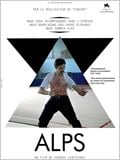 Alps 2011
Alps 2011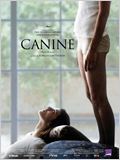 Canine 2009
Canine 2009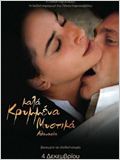 Athanasia, des secrets bien gardés 2008
Athanasia, des secrets bien gardés 2008
DOGTOOTH
Opens on Friday in Manhattan.
Directed by Yorgos Lanthimos; written by Mr. Lanthimos and Efthimis Filippou; director of photography, Thimios Bakatakis; edited by Yorgos Mavropsaridis; art direction and costumes by Elli Papageorgakopoulou; produced by Yorgos Tsourgiannis; released by Kino International. At the Cinema Village, 22 East 12th Street, Greenwich Village. In Greek, with English subtitles. Running time: 1 hour 34 minutes. This film is not rated.
WITH: Christos Stergioglou (Father), Michelle Valley (Mother), Aggeliki Papoulia (Older Daughter), Mary Tsoni (Younger Daughter), Hristos Passalis (Son) and Anna Kalaitzidou (Christina).


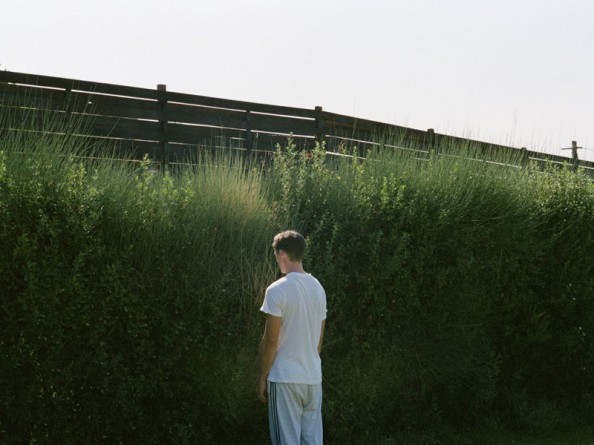

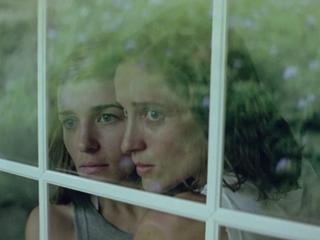
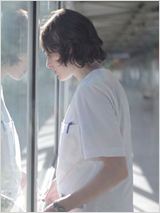

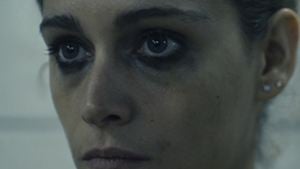
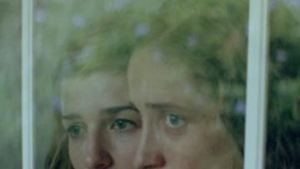
No comments:
Post a Comment